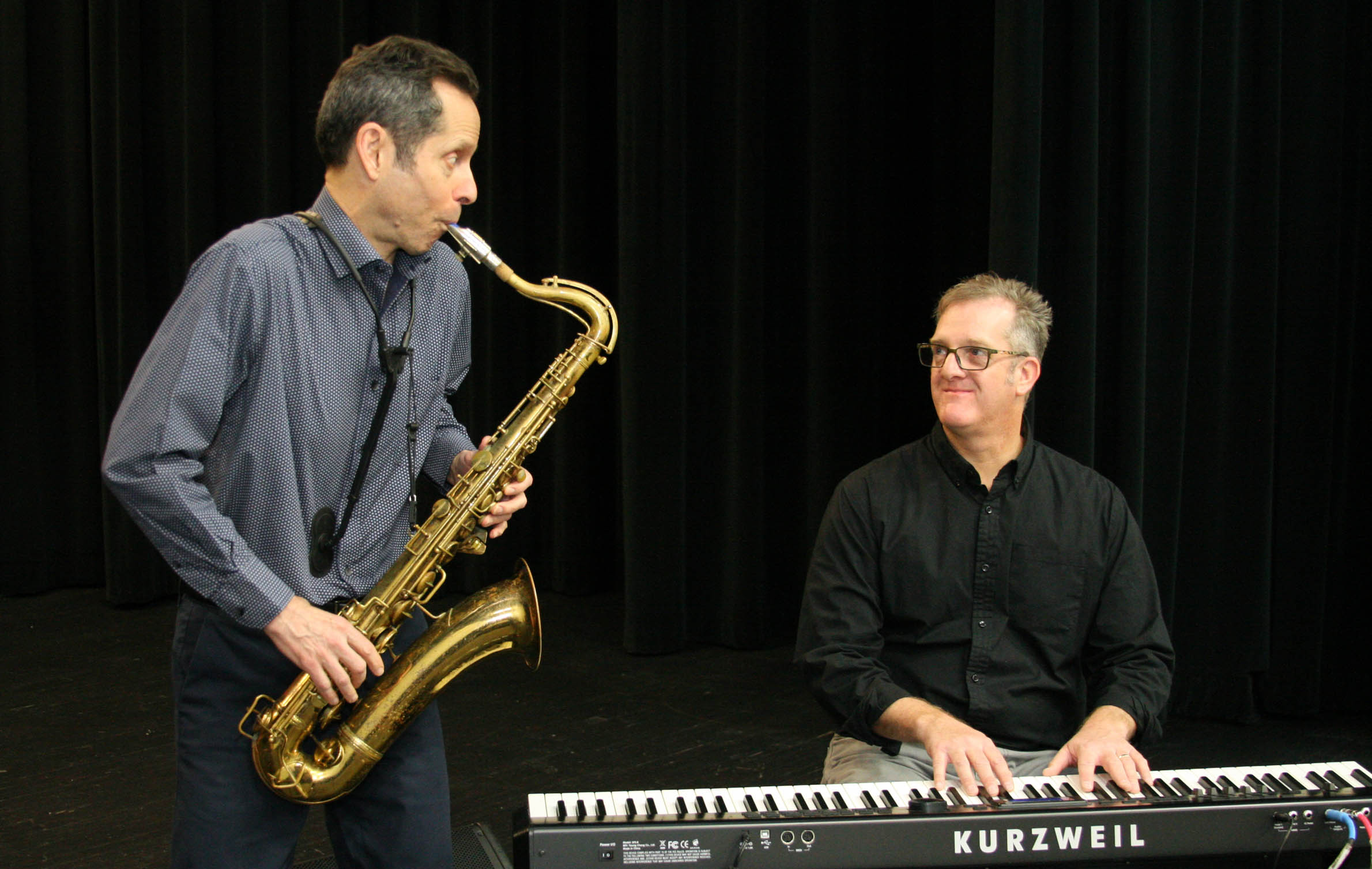
Gregg Gelb, left, and Steve Anderson improvise a few bars after "The Age of Jazz," their improvisational concert for students at Central Carolina Community College.

SANFORD - Two acclaimed musicians took students on a sweeping tour of America's jazz landscape earlier this month during "The Age of Jazz," an hour-long interpretive concert for students at Central Carolina Community College.
"Have you ever been to New Orleans and seen the parades?" asked Steve Anderson, a composer and pianist whose music has been published on 14 CDs, four of which have appeared on Grammy Award ballots. "When I went there a few years back, there just happened to be a wedding party. The bride was in front and dancing, and everyone behind her was dancing. So picture that group behind us."
He looked across the stage to Gregg Gelb, founder and director of the Heart of Carolina Jazz Orchestra, and with a couple of subtle nods, they were off. Anderson hit the keyboard with a driving bass beat in his left hand and a flourish in his right before Gelb slid in with clarinet for a rousing rendition of the Louis Armstrong classic, "When the Saints Go Marching In."
For the next hour, the duo led students through the development of jazz, a uniquely American style of music born just over 100 years ago near the mouth of the Mississippi River. And that's exactly where the two musicians began their concert -- in New Orleans with the Dixieland style, showing how solos and improvisation are two of the music's defining features.
Gelb talked briefly about how jazz began with musicians like Armstrong taking church music and "jazzing it up" -- giving them the chance to have fun with the tunes and create their own melodies on the spot by listening to each other and ad libbing within the music's established chords and beats. "We don't really know what we're going to do," Gelb explained. "It's just spontaneous music."
Musical improvisation is most associated with jazz and it's one thing that attracted Gelb to studying music when he was a student at Western Reserve University in Cleveland. "I love jazz because of its rich African-American history and its democratic process of allowing each member of the group to improvise," he said in an email exchange before the concert. "I have learned all about its history and worked hard to play it well. I really enjoy teaching and playing for people of all ages."
Moving beyond the Dixieland style, the musicians marched through Swing and Bebop before finishing with later styles influenced by musical theater, Latin sounds and rock. Gelb and Anderson explained how jazz transformed from generation to generation as younger people wanted faster music or became infatuated by richer chord structures.
Much of the conversation centered around social and historic influences on jazz, but, at one point, veered into musical theory. Anderson explained how musicians work with just 12 different notes and jazz composers kept adding more to their chords -- from three notes to as many as seven to create a more complex, richer sound -- before many contemporary musicians retreated to a simpler structure, some now using just a couple of notes.
Looking at jazz from so many angles is exactly what the interpretive concert was supposed to do. CCCC Social Sciences Lead Instructor Bianka Stumpf, who organized the event as part of an annual cultural enrichment series, said she wants to give students experiences that connect to their specific areas of study, but also cultivate a sense of wonder about the world around them.
It's not surprising that music appreciation students were in the Dennis A. Wicker Civic & Conference Center auditorium. But sitting among them were others studying American literature, American history and even early childhood education. Those students from the Creative Activities class were learning how experiences in art, music, creative movement and drama can enhance learning for preschool children and stimulate problem solving.
What they saw on stage might just spark ideas for creative activities -- not only using the music, itself, but perhaps by borrowing ideas from jazz, like having children enjoy their own solo moment or opportunity to improvise within the structure of a group activity.
Gelb, who teaches music appreciation at the college, hoped everyone would appreciate the music and the skillful interaction among musicians who are creating something unique every time they step on stage. "No two performances are ever the same," he said. "We always try new ideas."
To learn more about Central Carolina Community College, visit www.cccc.edu.

Gregg Gelb, left, and Steve Anderson improvise a few bars after "The Age of Jazz," their improvisational concert for students at Central Carolina Community College.